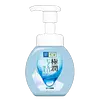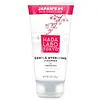What's inside
What's inside
 Key Ingredients
Key Ingredients

 Benefits
Benefits

 Concerns
Concerns

 Ingredients Side-by-side
Ingredients Side-by-side

Water
Skin ConditioningButylene Glycol
HumectantDisodium Cocoyl Glutamate
CleansingPEG-8
HumectantCocamidopropyl Betaine
CleansingCocamide DEA
EmulsifyingPEG-80 Sorbitan Laurate
Glycerin
HumectantSorbitol
HumectantSodium Taurine Cocoyl Methyltaurate
CleansingSodium Acetylated Hyaluronate
HumectantHydroxypropyltrimonium Hyaluronate
Petrolatum
EmollientCitric Acid
BufferingPolyquaternium-7
Disodium EDTA
BHT
AntioxidantMethylparaben
PreservativeWater, Butylene Glycol, Disodium Cocoyl Glutamate, PEG-8, Cocamidopropyl Betaine, Cocamide DEA, PEG-80 Sorbitan Laurate, Glycerin, Sorbitol, Sodium Taurine Cocoyl Methyltaurate, Sodium Acetylated Hyaluronate, Hydroxypropyltrimonium Hyaluronate, Petrolatum, Citric Acid, Polyquaternium-7, Disodium EDTA, BHT, Methylparaben
Sodium Cocoyl Glycinate
CleansingGlycerin
HumectantCocamidopropyl Betaine
CleansingButylene Glycol
HumectantPotassium Cocoyl Glycinate
Hydroxypropyl Starch Phosphate
Decyl Glucoside
CleansingPEG-400
Emulsion StabilisingWater
Skin ConditioningSodium Lauroyl Aspartate
CleansingBHT
AntioxidantCitric Acid
BufferingDisodium EDTA
Glyceryl Stearate Se
EmulsifyingHydroxypropyl Methylcellulose
Emulsion StabilisingHydroxypropyltrimonium Hyaluronate
Lauric Acid
CleansingMethylisothiazolinone
PreservativeMica
Cosmetic ColorantPEG-32
HumectantPhenoxyethanol
PreservativePolyquaternium-7
Polyquaternium-52
Sodium Acetylated Hyaluronate
HumectantSodium Stearoyl Glutamate
CleansingStearic Acid
CleansingTitanium Dioxide
Cosmetic ColorantSodium Cocoyl Glycinate, Glycerin, Cocamidopropyl Betaine, Butylene Glycol, Potassium Cocoyl Glycinate, Hydroxypropyl Starch Phosphate, Decyl Glucoside, PEG-400, Water, Sodium Lauroyl Aspartate, BHT, Citric Acid, Disodium EDTA, Glyceryl Stearate Se, Hydroxypropyl Methylcellulose, Hydroxypropyltrimonium Hyaluronate, Lauric Acid, Methylisothiazolinone, Mica, PEG-32, Phenoxyethanol, Polyquaternium-7, Polyquaternium-52, Sodium Acetylated Hyaluronate, Sodium Stearoyl Glutamate, Stearic Acid, Titanium Dioxide
Ingredients Explained
These ingredients are found in both products.
Ingredients higher up in an ingredient list are typically present in a larger amount.
BHT is a synthetic antioxidant and preservative.
As an antioxidant, it helps your body fight off free-radicals. Free-radicals are molecules that may damage your skin cells.
As a preservative, it is used to stabilize products and prevent them from degrading. Specifically, BHT prevents degradation from oxidation.
The concerns related to BHT come from oral studies; this ingredient is currently allowed for use by both the FDA and EU.
However, it was recently restricted for use in the UK as of April 2024.
Learn more about BHTButylene Glycol (or BG) is used within cosmetic products for a few different reasons:
Overall, Butylene Glycol is a safe and well-rounded ingredient that works well with other ingredients.
Though this ingredient works well with most skin types, some people with sensitive skin may experience a reaction such as allergic rashes, closed comedones, or itchiness.
Learn more about Butylene GlycolCitric Acid is an alpha hydroxy acid (AHA) naturally found in citrus fruits like oranges, lemons, and limes.
Like other AHAs, citric acid can exfoliate skin by breaking down the bonds that hold dead skin cells together. This helps reveal smoother and brighter skin underneath.
However, this exfoliating effect only happens at high concentrations (20%) which can be hard to find in cosmetic products.
Due to this, citric acid is usually included in small amounts as a pH adjuster. This helps keep products slightly more acidic and compatible with skin's natural pH.
In skincare formulas, citric acid can:
While it can provide some skin benefits, research shows lactic acid and glycolic acid are generally more effective and less irritating exfoliants.
Most citric acid used in skincare today is made by fermenting sugars (usually from molasses). This synthetic version is identical to the natural citrus form but easier to stabilize and use in formulations.
Read more about some other popular AHA's here:
Learn more about Citric AcidCocamidopropyl Betaine is a fatty acid created by mixing similar compounds in coconut oil and dimethylaminopropylamine, a compound with two amino groups.
This ingredient is a surfactant and cleanser. It helps gather the dirt, pollutants, and other impurities in your skin to be washed away. It also helps thicken a product and make the texture more creamy.
Being created from coconut oil means Cocamidopropyl Betaine is hydrating for the skin.
While Cocamidopropyl Betaine was believed to be an allergen, a study from 2012 disproved this. It found two compounds in unpure Cocamidopropyl Betaine to be the irritants: aminoamide and 3-dimethylaminopropylamine. High-grade and pure Cocamidopropyl Betaine did not induce allergic reactions during this study.
Learn more about Cocamidopropyl BetaineDisodium EDTA plays a role in making products more stable by aiding other preservatives.
It is a chelating agent, meaning it neutralizes metal ions that may be found in a product.
Disodium EDTA is a salt of edetic acid and is found to be safe in cosmetic ingredients.
Learn more about Disodium EDTAGlycerin is already naturally found in your skin. It helps moisturize and protect your skin.
A study from 2016 found glycerin to be more effective as a humectant than AHAs and hyaluronic acid.
As a humectant, it helps the skin stay hydrated by pulling moisture to your skin. The low molecular weight of glycerin allows it to pull moisture into the deeper layers of your skin.
Hydrated skin improves your skin barrier; Your skin barrier helps protect against irritants and bacteria.
Glycerin has also been found to have antimicrobial and antiviral properties. Due to these properties, glycerin is often used in wound and burn treatments.
In cosmetics, glycerin is usually derived from plants such as soybean or palm. However, it can also be sourced from animals, such as tallow or animal fat.
This ingredient is organic, colorless, odorless, and non-toxic.
Glycerin is the name for this ingredient in American English. British English uses Glycerol/Glycerine.
Learn more about GlycerinThis form of hyaluronic acid is produced through fermentation.
According to a manufacturer, it has a positive charge by ionic binding to help moisturize and give hair a smooth feel. This is why you'll find this ingredient in shampoos and body washes.
Polyquaternium-7 is a light to clear colored liquid. It is commonly found in haircare products for its film-forming and anti-static properties.
According to a manufacturer, it is a non-paraben and specially developed for negatively charged surfactant systems. This makes it a great hairstyle holder and helps to improve wet hair detangling without adding buildup.
Sodium Acetylated Hyaluronate is a type of Hyaluronic Acid.
Hyaluronic Acids help moisturize, soothe, and protect the skin.
Read about common types of Hyaluronic Acid here:
Sodium Hyaluronate
Hydrolyzed Hyaluronic Acid
Hyaluronic Acid
Water. It's the most common cosmetic ingredient of all. You'll usually see it at the top of ingredient lists, meaning that it makes up the largest part of the product.
So why is it so popular? Water most often acts as a solvent - this means that it helps dissolve other ingredients into the formulation.
You'll also recognize water as that liquid we all need to stay alive. If you see this, drink a glass of water. Stay hydrated!
Learn more about Water